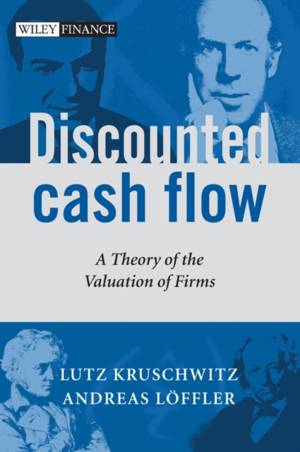
- Retrait gratuit dans votre magasin Club
- 7.000.000 titres dans notre catalogue
- Payer en toute sécurité
- Toujours un magasin près de chez vous
- Retrait gratuit dans votre magasin Club
- 7.000.000 titres dans notre catalogue
- Payer en toute sécurité
- Toujours un magasin près de chez vous
76,95 €
+ 153 points
Description
Firm valuation is currently a very exciting topic. It is interesting for those economists engaged in either practice or theory, particularly for those in finance. The literature on firm valuation recommends logical, quantitative methods, which deal with establishing today's value of future free cash flows. In this respect firm valuation is identical with the calculation of the discounted cash flow, DCF. There are, however, different coexistent versions, which seem to compete against each other. Entity approach and equity approach are thus differentiated. Acronyms are often used, such as APV (adjusted present value) or WACC (weighted average cost of capital), whereby these two concepts are classified under entity approach.
Why are there several procedures and not just one? Do they all lead to the same result? If not, where do the economic differences lie? If so, for what purpose are different methods needed? And further: do the known procedures suffice? Or are there situations where none of the concepts developed up to now delivers the correct value of the firm? If so, how is the appropriate valuation formula to be found? These questions are not just interesting for theoreticians; even the practitioner who is confronted with the task of marketing his or her results has to deal with it. The authors systematically clarify the way in which these different variations of the DCF concept are related throughout the book
ENDORSEMENTS FOR LÖFFLER: DISCOUNTED 0-470-87044-3
"Compared with the huge number of books on pragmatic approaches to discounted cash flow valuation, there are remarkably few that lay out the theoretical underpinnings of this technique. Kruschwitz and Löffler bring together the theory in this area in a consistent and rigorous way that should be useful for all serious students of the topic."
--Ian Cooper, London Business School
"This treatise on the market valuation of corporate cash flows offers the first reconciliation of conventional cost-of-capital valuation models from the corporate finance literature with state-pricing (or 'risk-neutral' pricing) models subsequently developed on the basis of multi-period no-arbitrage theories. Using an entertaining style, Kruschwitz and Löffler develop a precise and theoretically consistent definition of 'cost of capital', and provoke readers to drop vague or contradictory alternatives."
--Darrell Duffie, Stanford University
"Handling firm and personal income taxes properly in valuation involves complex considerations. This book offers a new, precise, clear and concise theoretical path that is pleasant to read. Now it is the practitioners task to translate this approach into real-world applications!"
--Wolfgang Wagner, PricewaterhouseCoopers
"It is an interesting book, which has some new results and it fills a gap in the literature between the usual undergraduate material and the very abstract PhD material in such books as that of Duffie (Dynamic Asset Pricing Theory). The style is very engaging, which is rare in books pitched at this level."
--Martin Lally, University of Wellington
Why are there several procedures and not just one? Do they all lead to the same result? If not, where do the economic differences lie? If so, for what purpose are different methods needed? And further: do the known procedures suffice? Or are there situations where none of the concepts developed up to now delivers the correct value of the firm? If so, how is the appropriate valuation formula to be found? These questions are not just interesting for theoreticians; even the practitioner who is confronted with the task of marketing his or her results has to deal with it. The authors systematically clarify the way in which these different variations of the DCF concept are related throughout the book
ENDORSEMENTS FOR LÖFFLER: DISCOUNTED 0-470-87044-3
"Compared with the huge number of books on pragmatic approaches to discounted cash flow valuation, there are remarkably few that lay out the theoretical underpinnings of this technique. Kruschwitz and Löffler bring together the theory in this area in a consistent and rigorous way that should be useful for all serious students of the topic."
--Ian Cooper, London Business School
"This treatise on the market valuation of corporate cash flows offers the first reconciliation of conventional cost-of-capital valuation models from the corporate finance literature with state-pricing (or 'risk-neutral' pricing) models subsequently developed on the basis of multi-period no-arbitrage theories. Using an entertaining style, Kruschwitz and Löffler develop a precise and theoretically consistent definition of 'cost of capital', and provoke readers to drop vague or contradictory alternatives."
--Darrell Duffie, Stanford University
"Handling firm and personal income taxes properly in valuation involves complex considerations. This book offers a new, precise, clear and concise theoretical path that is pleasant to read. Now it is the practitioners task to translate this approach into real-world applications!"
--Wolfgang Wagner, PricewaterhouseCoopers
"It is an interesting book, which has some new results and it fills a gap in the literature between the usual undergraduate material and the very abstract PhD material in such books as that of Duffie (Dynamic Asset Pricing Theory). The style is very engaging, which is rare in books pitched at this level."
--Martin Lally, University of Wellington
Spécifications
Parties prenantes
- Auteur(s) :
- Editeur:
Contenu
- Nombre de pages :
- 184
- Langue:
- Anglais
- Collection :
- Tome:
- n° 330
Caractéristiques
- EAN:
- 9780470870440
- Date de parution :
- 01-11-05
- Format:
- Livre relié
- Format numérique:
- Genaaid
- Dimensions :
- 175 mm x 251 mm
- Poids :
- 476 g







